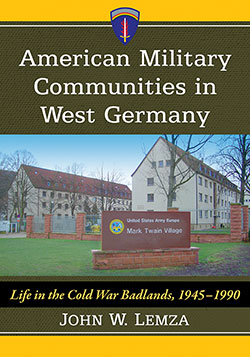American Military Communities in West Germany
Life in the Cold War Badlands, 1945–1990
$39.95
In stock
About the Book
On April 28, 1946, a small group of American wives and children arrived at the port of Bremerhaven, West Germany, the first of thousands of military family members to make the trans–Atlantic journey. They were the basis of a network of military communities—“Little Americas”—that would spread across the postwar German landscape. During a 45-year period which included some of the Cold War’s tensest moments, their presence confirmed America’s resolve to maintain Western democracy in the face of the Soviet threat. Drawing on archival sources and personal narratives, this book explores these enclaves of Americanism, from the U.S. government’s perspective to the grassroots view of those who made their homes in Cold War Europe. These families faced many challenges in balancing their military missions with their daily lives during a period of dynamic global change. The author describes interaction in American communities that were sometimes separated, sometimes connected with their German neighbors.
About the Author(s)
Bibliographic Details
John W. Lemza
Format: softcover (7 x 10)
Pages: 308
Bibliographic Info: 39 photos & illustrations, notes, bibliography, index
Copyright Date: 2016
pISBN: 978-1-4766-6416-3
eISBN: 978-1-4766-2410-5
Imprint: McFarland
Table of Contents
Acronyms and Abbreviations viii
Preface 1
Introduction 3
One. From First Arrivals to Established Network (1946–1967) 11
Two. The Footprint of American Culture and Consumerism (1946–1967) 38
Three. Religion, Race, Stereotyping and the Media (1946–1967) 55
Four. Anti-Communism and Nuclear Concerns (1946–1967) 82
Five. Challenge to American Economic Dominance (1946–1967) 108
Six. Fast Food, Violence, Crime and Drugs (1967–1990) 122
Seven. Race, Feminism and Media Manipulation (1967–1990) 146
Eight. Testing German-American Bonds (1967–1990) 172
Nine. Economic Challenges (1967–1990) 202
Conclusion 226
Chapter Notes 233
Bibliography 279
Index 285
Book Reviews & Awards
• “Lemza presents an engaging account of US military personnel, civilians, and their families as they lived in West Germany during the Cold War. One of the monograph’s strengths is the prodigious research that it evidences…a useful and stimulating work. Highly recommended”—Choice
• “A significant and insightful study of the American military experience on this frontier of the Cold War….[the] depth of research is very impressive…superbly researched and well-crafted study”—International Journal of Military History and Histiography





